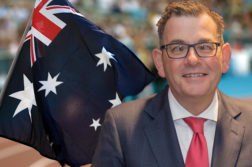Lee Rhiannon is arguably the most high profile and controversial new entrant to the Senate and comes to the job with considerable political experience. Having spent 11 years in the NSW upper house she has made the switch to the federal chamber with much on the record and her convictions well and truly on her sleeve. She has a long history of activism and community engagement and this drive looks set to continue in Canberra.
Throughout her career, and most notably during her push for a federal senate spot, Rhiannon has weathered personal attacks from both the left and the right. The criticism that has stuck is that she is in favour of more hardline left, "socialist-style" policies.
"Over the last 12 months I have had just about every name thrown at me," Rhiannon wrote for the ABC last month. "Extremist, anti Semitic, radical, communist and hard liner. People should know after 11 years in the NSW Parliament, I will not let bile-ridden labels and smears stop me speaking out and campaigning for the environment and justice."
Despite going on record to state that she has no leadership aspirations, Rhiannon’s motives for switching from state to federal politics have also been questioned. While in the short term it has been argued by old foe Mark Arons that "she has virtually no support among other Greens members of federal parliament" for the leadership, in the longer term and with her lengthy political experience, she may be one to watch as the Greens grow in both size and influence — and Bob Brown eventually retires.
From the Senate Rhiannon will have a more commanding position from which to speak than she did in the satellite chamber of NSW, although she’ll arguably have less room to move under the direction of federal party leader Brown. In the past, Rhiannon has come up against Brown, notably over revelations she breached NSW parliamentary rules when running for her federal senate spot, and controversially over the NSW Greens’ push to support the international Boycott, Divestment and Sanctions (BDS) against Israel that played out in the recent NSW state election.
In her new role she has said that she will not be pushing the BDS issue. Yet she qualified her position to the ABC’s 7.30 last month, "that doesn’t mean that I’m going to shy away from standing up for human rights for Palestinians".
While the pragmatism of political life and party membership may set some limits, it’s unlikely Rhiannon will abandon her previous form. In this way, she looks to become one of the more predictable new senators — although not in the way her detractors might imagine.
Despite the "watermelon" slur that persistently stalks her, Rhiannon has spent her time in the NSW upper house championing a few key issues.
Among these has been the ongoing stickler of political donation reform and electoral funding. In 2002 she initiated the Greens Democracy4Sale project with the aim of exposing the corrupting influence of political donations. In 2003 Rhiannon introduced a private members bill (later defeated) to ban donations from developers to the NSW government.
Rhiannon has continued this call, writing earlier this year that "we need national uniform electoral funding laws that require a ban on all donations from corporations and other organisations, strict limits on donations from individuals and caps on election expenditure."
Once in the new parliament, it is a safe bet that Rhiannon will continue this drive. This would be supported by the Green’s policy on constitutional and democratic reform that ultimately calls for "public funding of elections to eliminate private funding".
Like the Greens more generally, Rhiannon has stated that her number one priority in Canberra will be climate change. Her environmental credentials are sound. And as the new senators take their place and the national debate about climate change and carbon pricing comes to a point, Rhiannon will be centre stage with the Greens in deciding on the shape and of new climate policies.
Rhiannon is qualified botanist and zoologist and had a career as a zoo-keeper, activist, academic and freelance journalist before turning to politics. She founded and convened the Coalition for Gun Control. Later she was also the founder and director of AID/WATCH, an NGO set up to monitor Australia’s foreign development program.
With Rhiannon’s stance on the key issues well established, it will be interesting to see what kind of role she goes on to play within the party at a federal level, especially as the Greens vote grows, their power increases, and the party becomes more mainstream. Rhiannon is well aware of what this may mean, remarking recently, that "history shows progressive political parties can be effectively captured by the very system that they are trying to change". How Rhiannon deals with this challenge personally, and how the party deals with it more broadly, may shape the new Senate.
Like this article? Register as a New Matilda user here. It’s free! We’ll send you a bi-weekly email keeping you up to date with new stories on the site. And you can like New Matilda on Facebook here.
Want more independent media? New Matilda stays online thanks to reader donations. To become a financial supporter, click here.
Donate To New Matilda
New Matilda is a small, independent media outlet. We survive through reader contributions, and never losing a lawsuit. If you got something from this article, giving something back helps us to continue speaking truth to power. Every little bit counts.



